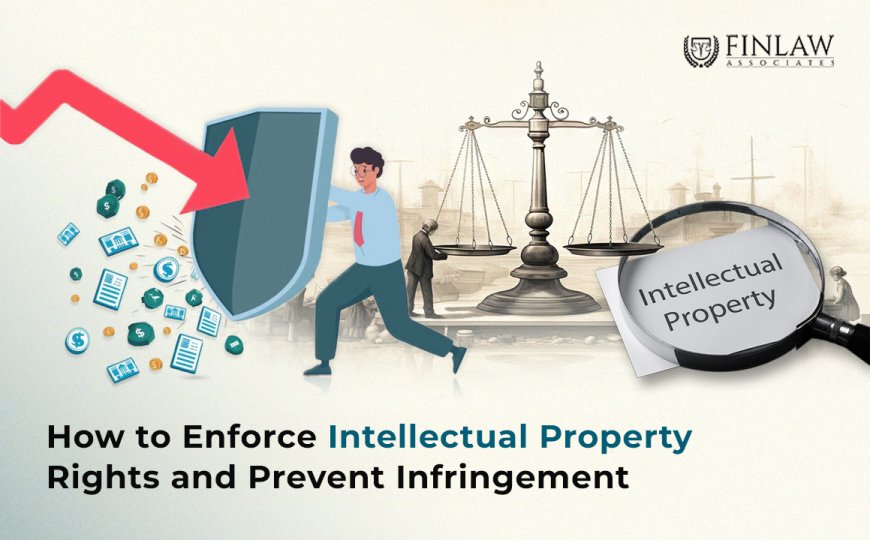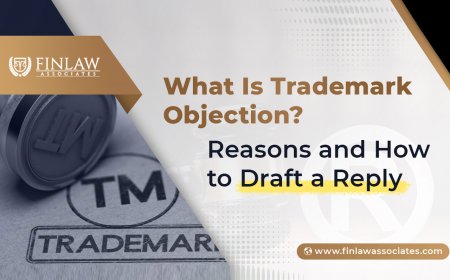How to Enforce Intellectual Property Rights and Prevent Infringement in India
Learn how to enforce Intellectual Property Rights in India — registration, monitoring, legal actions, and preventive strategies against infringement.

In an increasingly knowledge-based economy, Intellectual Property Rights (IPR) have become one of the most valuable assets for businesses, creators, and innovators. These rights not only encourage innovation but also ensure that the creators of intellectual works are duly rewarded for their efforts.
However, protecting these rights is becoming more complex due to rapid globalization, digitization, and counterfeit markets. In India, while the legal framework for Intellectual Property Rights is robust, enforcement remains the critical factor that determines how well these rights actually protect their owners.
This comprehensive guide explains how to enforce Intellectual Property Rights and prevent infringement in India—covering registration, detection, legal action, preventive measures, and recent enforcement trends.
What Are Intellectual Property Rights (IPR)?
Intellectual Property Rights are legal protections that grant creators exclusive rights over their intellectual creations. These can include inventions, designs, literary works, artistic creations, brand names, and trade secrets.
Major Types of Intellectual Property Rights in India
|
Type of IPR |
Law Governing It |
Examples |
Duration |
|
Trademarks |
Trade Marks Act, 1999 |
Logos, brand names, symbols |
10 years (renewable) |
|
Patents |
Patents Act, 1970 |
Inventions, new processes |
20 years |
|
Copyrights |
Copyright Act, 1957 |
Literary, artistic, and musical works |
60 years after author’s death |
|
Industrial Designs |
Designs Act, 2000 |
Product shapes, packaging designs |
10 years (extendable by 5 years) |
|
Geographical Indications (GIs) |
GI of Goods Act, 1999 |
Darjeeling Tea, Kanchipuram Silk |
Indefinite (renewable every 10 years) |
|
Trade Secrets |
Contract & Common Law Principles |
Formulas, customer lists, strategies |
As long as secrecy is maintained |
Each category of IPR is designed to protect a specific type of creation or innovation, ensuring both legal protection and commercial exclusivity.
Importance of Enforcing Intellectual Property Rights in India
Despite India’s extensive IPR framework, infringement remains a growing concern. According to the OECD, counterfeit and pirated goods account for over 3% of global trade, and India is both a source and a victim of such activities.
Without active enforcement:
-
Counterfeiters can damage brand reputation.
-
Innovators lose revenue and motivation.
-
Consumers face risks from substandard products.
-
Economic growth based on innovation is undermined.
Therefore, effective enforcement of Intellectual Property Rights ensures a fair marketplace, stimulates creativity, and promotes trust in Indian innovation on a global scale.
Step 1: Register and Secure Your Intellectual Property Rights
Before enforcement, you must establish ownership through proper registration. Registration provides a legal presumption of ownership and simplifies litigation.
Best Practices for Registration:
-
File early: Apply for patents, trademarks, or designs as soon as possible.
-
File internationally: Use systems like the Madrid Protocol or PCT for global protection.
-
Maintain proper records: Keep documentation like drafts, research data, and agreements.
-
Use ownership markings: Always display “©”, “®”, or “™” on creative assets and products.
These steps make it easier to prove ownership and strengthen your position during legal disputes.
Step 2: Monitor and Detect Infringement Proactively
IP enforcement begins with active monitoring. The faster you detect infringement, the easier it is to take action.
How to Monitor Effectively:
-
Online Brand Monitoring:
Set up Google Alerts or use IP protection tools like Red Points, MarkMonitor, or BrandShield to detect unauthorized use.
-
E-commerce Surveillance:
Regularly check marketplaces such as Amazon, Flipkart, and Alibaba for counterfeit products.
-
Social Media Tracking:
Monitor hashtags and mentions of your brand to find fake pages or plagiarized content.
-
Customs Recordation:
Register your IPR with the Indian Customs Department to stop counterfeit imports at the border.
-
App Store Monitoring:
If you own a digital product, monitor app stores for clones or unauthorized versions.
Consistent surveillance ensures you stay one step ahead of infringers.
Step 3: Immediate Legal Action Against Infringement
When infringement is identified, timely legal intervention is crucial to prevent further loss and establish a strong deterrent.
1. Send a Cease-and-Desist Notice
A cease-and-desist notice is often the first step in enforcement. It demands the infringer to stop unlawful activities immediately. It should include:
-
Proof of ownership (registration certificates)
-
Description of infringement
-
Deadline for compliance
-
Consequences for non-compliance
2. File a Civil Suit
Under Indian law, IP owners can seek:
-
Temporary or permanent injunctions
-
Damages or account of profits
-
Delivery and destruction of infringing goods
Courts in Delhi, Mumbai, and Bangalore are particularly proactive in granting interim injunctions in urgent IPR cases.
3. Initiate Criminal Proceedings
For trademark counterfeiting or copyright piracy, you can file a criminal complaint under:
-
Sections 103–105 of the Trade Marks Act, 1999
-
Sections 63–65 of the Copyright Act, 1957
Penalties can include imprisonment up to 3 years and fines up to ₹2 lakh.
4. Apply for Ex Parte and John Doe Orders
If the infringer is unknown or likely to destroy evidence, courts can issue:
-
Anton Piller Orders (search and seizure without notice)
-
Mareva Injunctions (asset freezing)
-
John Doe Orders (against unknown parties, often used in piracy cases)
Such remedies have been effectively used by media houses, software companies, and luxury brands in India.
Step 4: Use Customs and Border Protection
The Intellectual Property Rights (Imported Goods) Enforcement Rules, 2007 empower Indian Customs to block the import or export of counterfeit products.
How to Use This:
-
Record your IPR with the Central Board of Indirect Taxes and Customs (CBIC).
-
Provide product details, trademarks, and known counterfeit sources.
-
Respond promptly when customs notifies suspected shipments.
This mechanism prevents infringing goods from entering Indian markets, saving considerable enforcement effort later.
Step 5: Enforce Rights Online and Against Intermediaries
With the rise of digital platforms, online IPR enforcement is more relevant than ever.
Legal Support for Online Enforcement:
-
The Information Technology Act, 2000 and the Intermediary Guidelines, 2021 require platforms to remove infringing content upon notice.
-
Platforms like YouTube, Meta, and eBay provide built-in IP complaint mechanisms.
Practical Tips:
-
File Digital Millennium Copyright Act (DMCA)-style notices with web hosts or ISPs.
-
Register your brand on Amazon Brand Registry or Meta Rights Manager for automated detection.
-
Escalate through legal notices or court injunctions if platforms fail to comply.
Courts have recently imposed substantial penalties on platforms for repeated negligence, showing stronger accountability in India’s IP ecosystem.
Step 6: Protect Trade Secrets and Confidential Data
Trade secrets often form the backbone of competitive advantage. Since India doesn’t have a specific “Trade Secrets Act,” owners must rely on contracts and confidentiality measures.
Best Practices:
-
Use Non-Disclosure Agreements (NDAs) for employees and vendors.
-
Restrict data access through role-based security controls.
-
Use employee exit protocols to prevent data leakage.
-
Maintain digital audit trails for sensitive files.
Preventive confidentiality practices are often the most effective trade secret enforcement strategy.
Step 7: Build an Internal IPR Enforcement Framework
Creating a structured IP enforcement policy within your organization ensures consistent protection.
Key Elements:
-
Regular IP Audits: Verify registrations and renewals.
-
Employee Training: Educate staff on IP ownership and infringement detection.
-
Vendor Contracts: Include IP protection clauses and indemnity terms.
-
Track-and-Trace Technology: Use holograms or QR codes for product authentication.
-
Appoint an IP Compliance Officer: For continuous monitoring and reporting.
Companies like Hindustan Unilever and Infosys have strong internal IPR frameworks that combine legal and technical safeguards.
Preventive Measures to Avoid Future Infringement
-
Consumer Awareness: Educate your customers to identify genuine products.
-
Market Surveillance: Conduct periodic sweeps of online and offline marketplaces.
-
Publicize Enforcement Success: Announce legal victories to deter potential infringers.
-
Collaborate with Industry Bodies: Work with FICCI, ASSOCHAM, or WIPO on IP protection campaigns.
FAQs on Intellectual Property Rights Enforcement in India
Q1. How can I file a complaint for IP infringement in India?
You can file a civil suit in a district or High Court with jurisdiction or lodge a criminal complaint with the police under relevant IPR laws.
Q2. Is copyright registration mandatory for enforcement?
While copyright exists automatically upon creation, registration makes legal enforcement and evidence submission much easier.
Q3. Can foreign companies enforce Intellectual Property Rights in India?
Yes. Foreign entities can enforce IPRs in India if they have registered their IP or applied for protection under international treaties like TRIPS, Madrid Protocol, or PCT.
Q4. How long does IPR enforcement take in India?
Civil cases may take months to years depending on complexity, but interim injunctions can often be obtained within days for urgent cases.
Conclusion
Effective enforcement of Intellectual Property Rights in India is a continuous process requiring vigilance, preparation, and legal expertise. With a combination of registration, active monitoring, prompt legal action, and preventive measures, businesses can safeguard their innovations and maintain a competitive edge.
In a rapidly evolving digital economy, proactive IPR enforcement not only protects individual creators and companies but also strengthens India’s reputation as a global hub for innovation, technology, and creativity.
What's Your Reaction?















